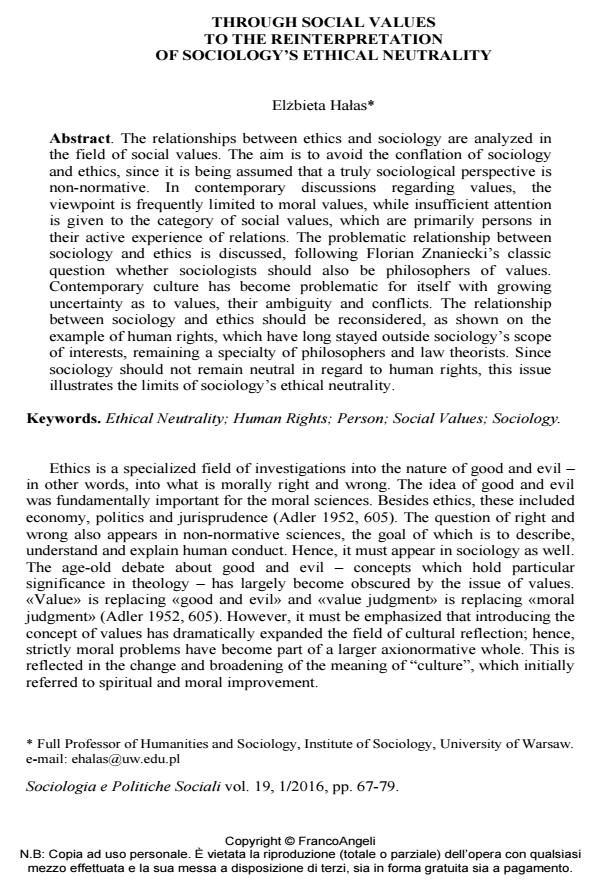Through social values to the reinterpretation of sociology’s ethical neutrality
Journal title SOCIOLOGIA E POLITICHE SOCIALI
Author/s Elzbieta Halas
Publishing Year 2016 Issue 2016/1
Language Italian Pages 13 P. 67-79 File size 116 KB
DOI 10.3280/SP2016-001004
DOI is like a bar code for intellectual property: to have more infomation
click here
Below, you can see the article first page
If you want to buy this article in PDF format, you can do it, following the instructions to buy download credits

FrancoAngeli is member of Publishers International Linking Association, Inc (PILA), a not-for-profit association which run the CrossRef service enabling links to and from online scholarly content.
The relationships between ethics and sociology are analyzed in the field of social values. The aim is to avoid the conflation of sociology and ethics, since it is being assumed that a truly sociological perspective is non-normative. In contemporary discussions regarding values, the viewpoint is frequently limited to moral values, while insufficient attention is given to the category of social values, which are primarily persons in their active experience of relations. The problematic relationship between sociology and ethics is discussed, following Florian Znaniecki’s classic question whether sociologists should also be philosophers of values. Contemporary culture has become problematic for itself with growing uncertainty as to values, their ambiguity and conflicts. The relationship between sociology and ethics should be reconsidered, as shown on the example of human rights, which have long stayed outside sociology’s scope of interests, remaining a specialty of philosophers and law theorists. Since sociology should not remain neutral in regard to human rights, this issue illustrates the limits of sociology’s ethical neutrality.
Keywords: Ethical Neutrality; Human Rights; Person; Social Values; Sociology
- Handbuch Kultursoziologie Elżbieta Hałas, pp.217 (ISBN:978-3-658-07615-3)
- Methodology of Relational Sociology Pierpaolo Donati, pp.3 (ISBN:978-3-031-41625-5)
- Quelle sociologie relationnelle? Une perspective non relationniste Pierpaolo Donati, in Nouvelles perspectives en sciences sociales /2018 pp.325
DOI: 10.7202/1044020ar - Methodology of Relational Sociology Davide Ruggieri, pp.295 (ISBN:978-3-031-41625-5)
- Handbuch Kultursoziologie Elżbieta Hałas, pp.1 (ISBN:978-3-658-08000-6)
Elzbieta Halas, Through social values to the reinterpretation of sociology’s ethical neutrality in "SOCIOLOGIA E POLITICHE SOCIALI" 1/2016, pp 67-79, DOI: 10.3280/SP2016-001004